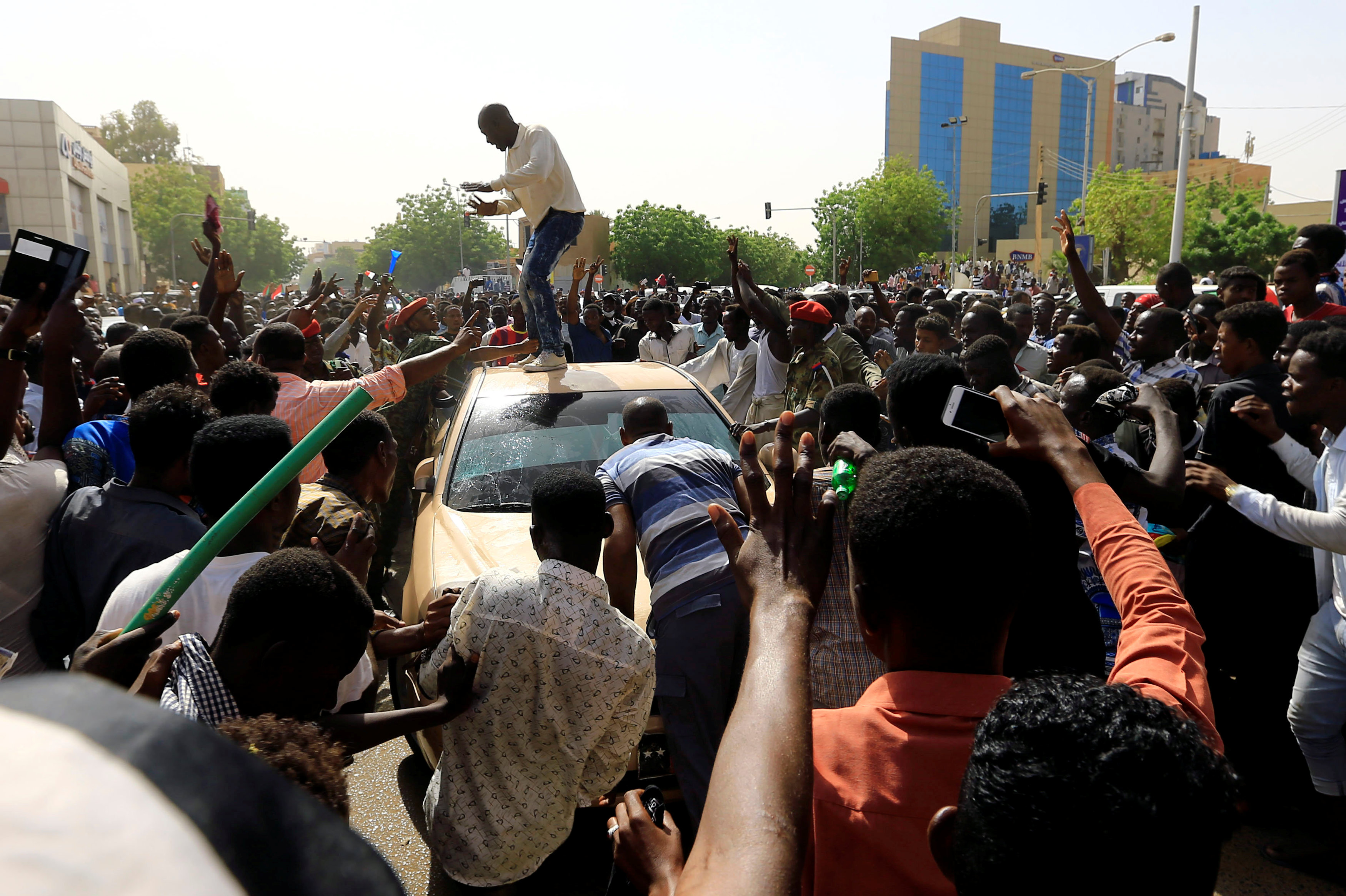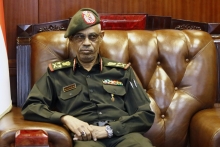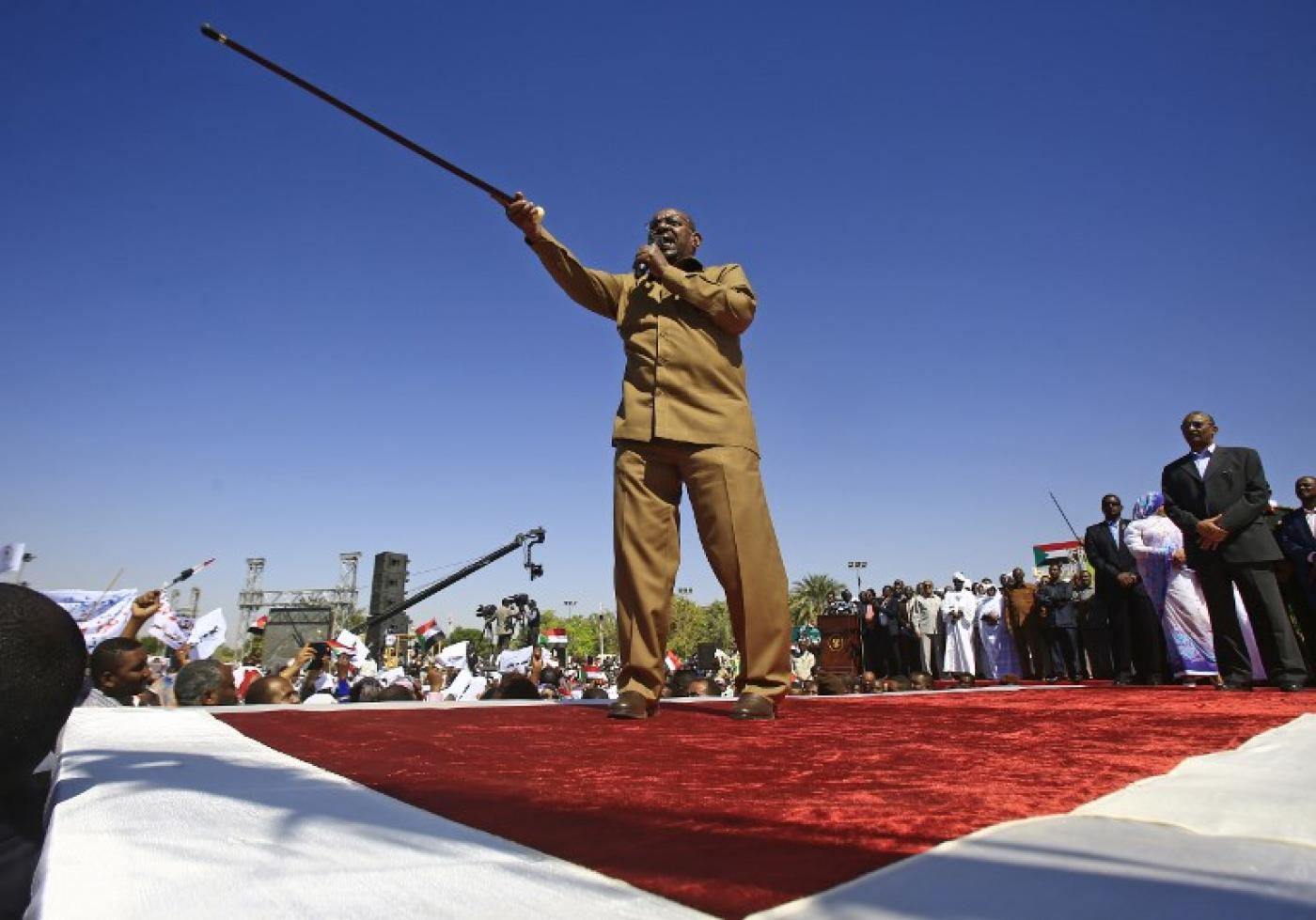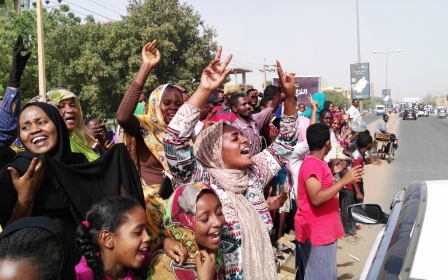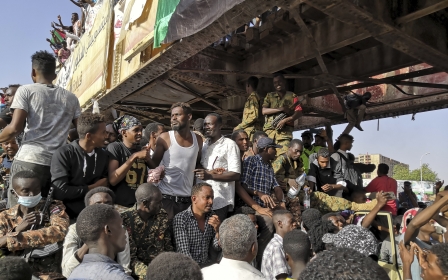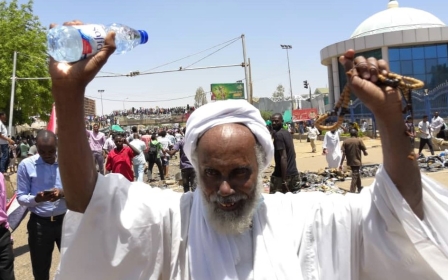Live: Protests continue in Sudan after Bashir toppled in 'coup'
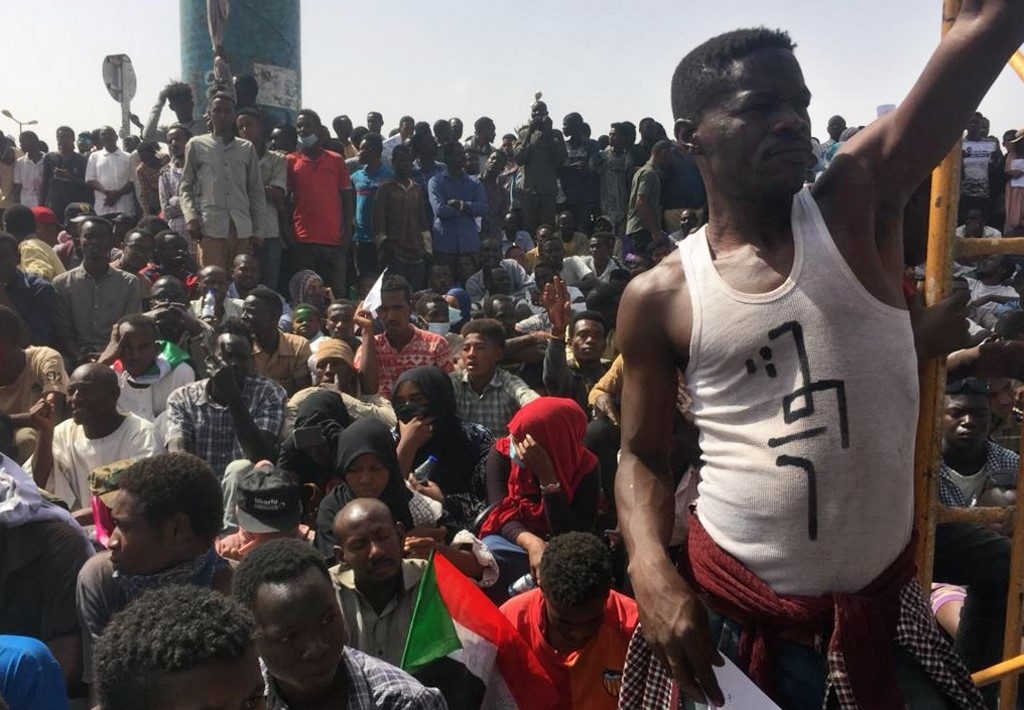
Mises à jour du direct
UN Secretary General Antonio Guterres has called for "calm and utmost restraint" by all parties involved in Sudan.
Guterres called for an "appropriate and inclusive transition process" - with UN support - that meets the democratic aspirations of the Sudanese people.
"The secretary-general reaffirms that the United Nations stands ready to support the Sudanese people as they chart a way forward," his office said in a statement.
As the curfew in Khartoum - set by the Sudanese Armed Forces for 10 pm local time - approaches, protesters have vowed to remain in the streets.
Mohamed Zain, a demonstrator standing in a square by the military headquarters in Khartoum, described an atmosphere of defiance in the Sudanese capital.
Protesters will spend the night in the square "to challenge the regime and break the curfew", Zain told MEE in a phone interview.
Amira Osman, a professor at Tshwane University of Technology Pretoria in South Africa and a member of the Sudan Solidarity Group - an organisation that helps the Sudanese diaspora - told Middle East Eye that women have been leading the protests.
"The role of women in the revolution has perhaps been the most incredible social change. Having been subjected to years of abuse because of backward interpretations of religious texts applied through law, women are now leading the way to a new political future," she said.
The end of Bashir's reign is a "momentous opportunity" for upholding human rights and the rule of law in Sudan, Human Rights Watch (HRW), a New York-based advocacy group, has said.
On Thursday, the organisation called on Sudanese authorities to answer the demands of protesters calling for freedom, justice and peace.
The rights group also urged international organisations, including the United Nations and the African Union to push for "full respect for the basic rights of Sudanese people" from Defence Minister Awad Ahmad Ibn Auf, who is now in charge of the government in Khartoum.
"This significant development reinforces the authorities’ obligation to address egregious human rights abuses suffered by so many Sudanese over the last three decades," Jehanne Henry, associate Africa director at HRW, said in a statement.
"Al-Bashir’s ouster is a testament to the tenacity of the protesters, who remained in the streets despite the government’s violent repression."
Almost every night since the Khartoum sit-in began on Saturday, pro-Bashir security forces have tried to disperse protesters by force.
This led to gunfights with soldiers deployed on the ground who ended up protecting the protesters.
The support displayed by soldiers has confused many activists, who questioned whether the troops were acting individually or obeying commands to side with the protesters.
Even by Wednesday, the army's position was not clear, and a military spokesman said troops were willing to break up the protests. However, a military source told MEE, on condition of anonymity, that junior officers played a big role in the army's reluctance to crack down on the sit-in.
"The junior army officers actually had a complementary role of supporting the Sudanese Revolution," the source said.
He added that there are ongoing attempts by pro-government militias to break up the movement within the military that's sympathetic to protesters.
Sudan's President Omar al-Bashir was ousted by the country's military on Thursday. Here's a timeline of the movement that toppled him and which has pledged to continue until power is handed to a civilian government.
- 19 December: The ruling National Congress Party's headquarters were burnt down in the northern town of Atbara after weeks of rising tension over rising living costs and austerity measures, turning the anger directly onto the government.
- In the following week, protests spread to cities around the country and authorities responded with tear gas, beatings and often live fire.
- 25 December: The Sudanese Professionals Association organises major protests in Khartoum, aiming to march to the presidential palace and hand over demands for Bashir to resign. A heavy-handed response from the security forces prevents them approaching.
- 24 January: Abuse of protesters, including shaving their heads and mass imprisonments, and lethal force on several in the Khartoum neighbourhood of Burri turned their funerals into rallying points for the largest protests yet.
- 22 February: Bashir declares a state of emergency and reshuffles his cabinet. Military and intelligence officials were appointed to key positions, raising suspicions about a power struggle. Bashir calls on parliament to postpone plans to amend the law so he can run for another term as president.
- 6 April: Tens of thousands gather outside the army headquarters to mark the anniversary of the 1985 uprising that opposed the military rule of Gaafar Nimeiri. A sit-in starts that night and evolves into the protest that topples Bashir.
- 11 April: Defence Minister Awaf Ahmad Auf announces Bashir has been arrested and the army will take power for a two-year "transitional period." Protesters reject army rule and insist they will continue until their demands for civilian government are met.
Sudanese protesters have been thronging the streets of Khartoum and elsewhere in the country in protest against what they see as the replacement of Bashir with another establishment figure.
“This is actually nothing as there are no changes in faces, symbols and even policies,” Amged Ali, a protester in Khartoum, told MEE.
Protesters in the capital blocked and jumped on top of a military official's car, making known their anger at the military coup by the army, who said they would take charge of the country for a two-year "transitional period."
Only hours earlier the mood had completely different, with thousands celebrating with soldiers in the streets as news filtered out about Bashir's exit.
One 55-year-old mother of a protester killed during the anti-Bashir movement, which began in December, said she wants justice for the killed.
“If we want this revolution to succeed and reach its great goals we need to impose a transparent system of justice and accountability.”
The image of Bashir's face merging into defence minister Awad Ahmad Ibn Auf's reflects the chants on the street today that insist protesters will not accept Bashir simply being replaced by another member of his own government.
"We will not exchange one Koz [the term used to describe ruling party members] with a Koz," has been a chant repeated in Khartoum and elsewhere in the country.
Patrick Smith, editor of Africa Confidential who has covered the region for over three decades, told Middle East Eye that the transition in Sudan will be “a lot more complex and contested than anyone thinks”.
“Nobody is in charge right now. The Vice President [and Defence Minister Lt Gen Awad Ibn Auf who announced on state television that Bashir was under arrest on Thursday] is nominally in charge but the bulk of the army won’t stand for that,” said Smith.
Many, he said, are watching Lt Gen Kamal Abdul-Marouf, the military’s joint chief of staff, to see if can play the role of a midwife to a transitional regime.
Regardless of today’s announcement, there will be a lingering problem with consensus among the military.
“More or less everyone over the rank of colonel in the army has bought in, more or less, to the regime. Everyone under that rank is against [Bashir]. The young soldiers and officers are against him,” he said.
Anxious Sudanese protesters had waited hours for an "important annoucnement" from the army but when it came, delivered by defence minister Awad Ahmad ibn Auf, sat on a gold armchair, it was a disappointing declaration of the army taking control of the country and imposing a state of emergency.
Ibn Auf has become an immediate focus for the anger.
He rose to become Sudan's Vice President in February at a time when Bashir's power seemed to be faltering, but did not ultimately fail, and questions rose about whether the military would try to take power then.
Ibn Auf was sanctioned by the US in 2007 for his alleged role in war crimes in Darfur when he was head of military intelligence.
He was accused of supporting and directing attacks by the Janjaweed militia during the violence, when Bashir's forces are accused of killing up to 400,000 people.
The Sudanese Professionals Association said it rejects the "coup" declared by defence minister Awad Ahmad Ibn Auf and called for protests to continue until authority is passed on to "a civilian transitional government that represents the revolution's forces."
"The regime has staged a military coup that reproduces the same faces and institutions that have angered our great nation. Those who destroyed the country and killed its people are seeking to rob every drop of blood and sweat spilled by the Sudanese nation to shake its throne," the statement said.
"We call on our nation to protect its noble sit-in in front of the defence ministry's building and other regions and to remain on the streets across all cities of Sudan," it said. "We are holding to the squares and streets we've liberated by force," the statement said, adding: "These are our final words and we'll meet on the streets that do not betray."
After this morning's celebrations, protests have resumed in the capital Khartoum. Live footage from Burri, a neighbourhood at the centre of many of the protests, showed protesters burning tyres immediately after the announcement that the army would take conrol.
"Important statement: the revolution continues," was the concise reaction issued by the Sudanese Doctors' Committee to news that while Bashir has been ousted, the military plans to take control of the country for the next two years.
Translation: Before the statement: Just Fall. After the statement: Just Fall.
Activists had been warning since the morning, in anticipation of the army's announcement, that they would only accept power being handed to a civilian government and many have reacted with anger to the televised statement by defence minister Awad Ahmad ibn Awf.
Translation: Down, down, military rule
Protesters have reacted by mocking the announcement and insisting their protests will now continue and many have also said they are waiting on the reaction from the Sudanese Professionals Association, who have led the protest organisation in Khartoum.
Translation: They stole our joy
Sudan's longstanding president Omar al-Bashir had been removed from power and detained by the army, weeks after protesters first took to the streets across the country demanding his resignation.
From the 1989 coup that brought him to power to his role in the Darfur genocide, here’s a recap of his 30 years in power.
Sudan's President Omar al-Bashir has been ousted and the country's defence minister Awad Ahmed Ibn Auf announced drastic changes to the country.
- A military committee will be in charge for a two-year transitional period
- A three-month state of emergency has been imposed, including curfew from 10pm
- The cabinet and parliament have been dismantled and the 2005 constitution dissolved
- A 24-hour block at all ports and on travel


